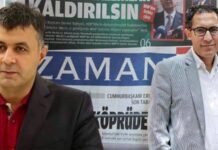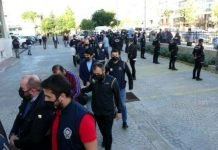A disabled prison inmate who, according to his wife, cannot take care of his personal needs on his own was denied the opportunity for release on probation after a medical report deemed him fit to remain in prison.
Yavuz Selim Burgu, who has been in a prison in the Central Anatolian city of Kayseri since May 10, 2017 and who is orthopedically handicapped, recently became eligible for release on probation under a law that allows disabled detainees to benefit from probation and spend the last three years of their sentence on the outside provided that they prove their disability with a medical report. Yet Burgu will not be released on probation because a medical report deemed him fit to remain in prison.
Speaking to the Bold Medya news website his wife Rukiye said: “Normally, my husband’s prison term would end in November 2023. Under the law he is entitled to probation for the last three years since he is disabled. The hospital was supposed to report that he could not stay in prison, but it failed to do so.”
Burgu, 44, had an ambulatory disability attested to by medical reports and caused by polio he suffered at the age of two. He cannot use his left leg due to sensory loss. He had an operation on his right leg, forcing him use crutches. He also suffers advanced hearing loss in the left ear. In addition, he had to undergo kidney surgery last year for kidney stones. He was sent back to prison a few days after the operation.
Burgu was briefly detained in September 2016 in the aftermath of a failed coup in Turkey as part of a post-coup purge and released on health grounds. He was detained once again in April 2017 and put in pre-trial detention on charges of links to the Gülen movement, a faith-based dissident group that has long been targeted by Turkey’s president, Recep Tayyip Erdoğan.
He was sentenced to eight years, nine months in prison for membership in an “armed terrorist organization,” that is, the Gülen movement, which was designated as a terrorist group by President Erdoğan after December 17 and 25, 2013 corruption investigations that implicated him, some of his cabinet ministers and his close associates. His sentence was upheld by the Supreme Court of Appeals.
According to his wife, the physical aspects of two-story wards make her husband’s life miserable. “My husband did not say anything to me fearing to upset me, but I learned it from his cellmates. His condition is pretty bad. The cells are located upstairs and the kitchen and sink downstairs. My husband has a hard time going up and down the stairs. He can’t take care of his personal needs alone. He has fallen three times,” she said.
“Stones had formed in his kidneys before his incarceration, but they weren’t so serious. The stones grew quickly during his two years in prison because he had difficulty moving around there. The wards have two floors . Living in a two-story ward with crutches is not easy for him. So when the stones grew, the doctors decided to operate to remove them,” his wife said.
A few days after the surgery Burgu was sent back to the prison. He needs physical therapy but cannot get it regularly. He has sensory loss in his left leg; therefore, he can’t use it, causing him totally to rely on his right leg. Over time he developed problems in his right leg, too, for which he also had surgery.
Under the Turkish Law on the Execution of Sentences, convicts who cannot sustain their lives alone due to a serious illness, disability or senescence can benefit from release on probation if they have three years or less remaining prison time and provided that their condition is documented with a full medical report.
Since Burgu’s prison term will end in November 2023, he is entitled to be released on probation because he is disabled. Yet, according to a medical report issued by the Kayseri Medical Center on August 21, Burgu can maintain his life alone in prison. “While drafting the report, they did not take the prison conditions into consideration,” Rukiye said.
Both Yavuz Selim and his wife were civil servants, the former being a teacher and the latter an official at the land registry administration. They were dismissed from their jobs by emergency decree-laws enacted during a two-year state of emergency declared after the abortive coup.
President Erdoğan stepped up the crackdown on the movement after the coup attempt, which he accused the movement’s US-based spiritual leader, Fethullah Gülen, of masterminding — an accusation strongly denied by the cleric – dismissing some 150,000 civil servants from state jobs and investigating almost 600,000 people, detaining or arresting half of them on trumped-up terrorism-related charges.
















